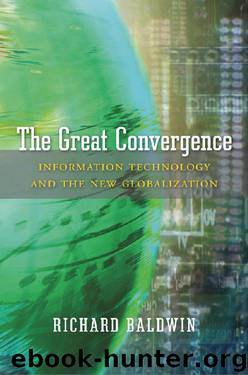The Great Convergence by Richard Baldwin

Author:Richard Baldwin [Baldwin, Richard]
Language: eng
Format: epub
Publisher: Harvard University Press
Published: 2016-11-13T18:30:00+00:00
Globalization: Less Predictable
Old Globalization was primarily driven by reductions in the cost of moving goods. By their very nature, lower trade costs for goods tend to affect traded goods in roughly similar ways over time. Of course, exporting gravel is different from exporting cut flowers, but in both sectors, a one percent drop in trade costs in 1985 had an impact qualitatively similar to a one percent drop in 1980. This made globalization’s impact on national economies rather predictable.
If lower shipping costs helped a nation’s cut-flower sector in 1980, a further reduction in 1985 was likely to also help the sector. In short, because competition was at the sector level and globalization meant lower trade costs, the likely losers and winner from future globalization resembled those sectors that had lost or won in the recent past. This “past as a guide to the future” logic led governments to talk about “sunrise” and “sunset” sectors. Or put in Ricardian terms, deeper globalization meant a nation would shift more resources from its comparative disadvantage sectors to its comparative advantage sectors.
When international competition shifted from the level of sectors to the level of stages, the past became less reliable as a guide to the future. Or more precisely, the traditional mental model employed to do the forecasting missed the essential change—that globalization was unbundling factories and offices. In both sunrise and sunset sectors, some production stages moved, others didn’t. As a consequence, the winners and losers from globalization are much harder to predict.
The real difficulty is in working out which stages will go next. It is hard since economists do not really understand in any detail the “glue” that was responsible for the microclustering in the first place. Knowing the direct cost of telecommunications is not enough since it interacts in complex and poorly understood ways with the nature of stages and their interconnectedness with other stages.
Indeed the issue is so complex that whole flocks of firms have been created to advise companies on offshoring. A snippet from the website of one of these firms, QS Advisory, gives an idea of the complexity of the offshoring decision. After noting that lots of firms offshore but few “have been able to tap its potential to deliver continuous, long-term results,” the company explains the difficulty: “Exploring sourcing options and choosing the optimum one for a business requires sourcing experience and expertise in multiple business contexts. The ability to bring in diverse perspectives, understand emerging trends and a detailed insight into the potential business impact, are all critical.”8
The unpredictability issue can also be seen in the example of apparel marketer Uniqlo. Its story shows that in a world of mix-and-match comparative advantage, good jobs can be created in losing sectors.
Low-end clothing is a classic sunset sector for nations like Japan, according to the traditional thinking. When sectors are viewed as engaging in made-here-sold-there goods and production is viewed as a national thing, then a sector like apparel (whose production is unskilled-labor-intensive) should be struggling to survive in a high-wage nation like Japan.
Download
This site does not store any files on its server. We only index and link to content provided by other sites. Please contact the content providers to delete copyright contents if any and email us, we'll remove relevant links or contents immediately.
| Accounting | Economics |
| Exports & Imports | Foreign Exchange |
| Global Marketing | Globalization |
| Islamic Banking & Finance |
50 Economics Classics by Tom Butler-Bowdon(2570)
Six Billion Shoppers by Porter Erisman(2302)
Why Nations Fail: The Origins of Power, Prosperity, and Poverty by Daron Acemoglu & James Robinson(2297)
No Time to Say Goodbye(2115)
Red Notice by Bill Browder(2077)
Currency Trading For Dummies by Brian Dolan(1927)
The Economist [T6, 22 Thg9 2017] by The Economist(1926)
Thank You for Being Late by Thomas L. Friedman(1768)
Bitcoin: The Ultimate Guide to the World of Bitcoin, Bitcoin Mining, Bitcoin Investing, Blockchain Technology, Cryptocurrency (2nd Edition) by Ikuya Takashima(1699)
Amazon FBA: Amazon FBA Blackbook: Everything You Need To Know to Start Your Amazon Business Empire (Amazon Empire, FBA Mastery) by John Fisher(1575)
Coffee: From Bean to Barista by Robert W. Thurston(1544)
The Future Is Asian by Parag Khanna(1483)
The Great Economists by Linda Yueh(1454)
How Money Got Free: Bitcoin and the Fight for the Future of Finance by Brian Patrick Eha(1425)
Grave New World by Stephen D. King(1419)
Pocket World in Figures 2018 by The Economist(1418)
Capitalism Without Capital: The Rise of the Intangible Economy by Jonathan Haskel(1401)
The Sex Business by Economist(1385)
Cultural Intelligence by David C. Thomas(1288)
